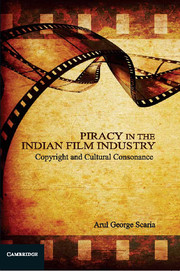Book contents
- Frontmatter
- Dedication
- Contents
- Preface
- Acknowledgments
- List of Abbreviations
- 1 Introduction
- 2 Piracy and the Indian Film Industry
- 3 Copyright Law in India: A Historical, Cultural and Legal Analysis
- 4 Copyright Piracy and Consumers: Insights from an Empirical Survey
- 5 In Search of Optimal Legal and Policy Options
- 6 Conclusion
- Appendix 1 Detailed Description of the Methodology Used in the Study
- Appendix 2 Questionnaire Used for the Empirical Survey
- Appendix 3 Tables
- Bibliography
- Index
5 - In Search of Optimal Legal and Policy Options
Published online by Cambridge University Press: 05 June 2014
- Frontmatter
- Dedication
- Contents
- Preface
- Acknowledgments
- List of Abbreviations
- 1 Introduction
- 2 Piracy and the Indian Film Industry
- 3 Copyright Law in India: A Historical, Cultural and Legal Analysis
- 4 Copyright Piracy and Consumers: Insights from an Empirical Survey
- 5 In Search of Optimal Legal and Policy Options
- 6 Conclusion
- Appendix 1 Detailed Description of the Methodology Used in the Study
- Appendix 2 Questionnaire Used for the Empirical Survey
- Appendix 3 Tables
- Bibliography
- Index
Summary
Overview
The data from the empirical survey, discussed in the previous chapter, provide many important insights for legal and policy reforms in the area of Indian copyright law. On the positive side, the data show high moral consciousness against piracy among all categories of respondents in the survey. The data also show high awareness about the social costs of piracy. Such positive responses, apart from high awareness of the illegality of different behaviours considered as piracy, create the impression that it is easier to increase the voluntary compliance of copyright law in India, when compared to many other nations with a different cultural orientation towards copyright and piracy. But the data also show that despite high legal awareness, a majority of the respondents consider the probability of law enforcement as low or very low. In other words, the data reveal the interesting aspect that though people are aware of the law, they consider that the law may never be enforced. This result assumes specific significance, as the data also show that a majority of the respondents in the study have exposure to pirated products like movie VCDs/DVDs, despite their high moral and legal consciousness regarding piracy. But does this mean the state should imprison more people or impose more severe punishments widely to change the perceptions regarding enforcement? Are such punishments really possible in the present socio-economic context in India? Where does the current legal system fail?
- Type
- Chapter
- Information
- Piracy in the Indian Film IndustryCopyright and Cultural Consonance, pp. 139 - 208Publisher: Cambridge University PressPrint publication year: 2014



